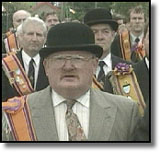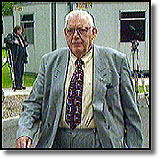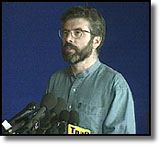
|
Tension Mounts as Unionists Split After March DecisionTension is mounting in Northern Ireland as Protestants prepare for their traditional July 12th celebrations in the wake of the decision to cancel or reroute some of the planned parades.Security forces came under attack in north Belfast late on Friday night, and members of an Army-police patrol were reported to have been injured as guns were fired. Security sources said the incident happened at Hillview Street in an area between Protestant and Catholic areas. Unionist politicians and representatives of the Protestant Orange Order were in disarray after the decision of local Orange Lodges to cancel or reroute five controversial parades through Catholic areas. The Orangemen had announced in a series of statements that they would not march through potential flashpoints, to "protect the safety of our people".
"The only people who concede in this country are the Protestants and Loyalists. We have a thirty year history of conceding everything. There is a chasm between ordinary Orangemen, and their "so-called leaders", he said.
Sinn Fein President Gerry Adams, reacting to the news that the marches were being re-routed said that a door had been opened, and that there was a "real possibility" of a durable solution to the problem. He said that he appreciated the significance of the move, adding that he would leave no stone unturned in the search for peace. Acting in the Best Interests of Northern Ireland"I hope the people of Northern Ireland will have seen the Orange Order is acting in the best interests of Northern Ireland," said Mr Donaldson. He insisted the move was not a response to threats from Republican paramilitaries. The Deputy Grand Master of the Ornage Lodge in Londonderry, Douglas Caldwell defended the decision to re-route five marches. He said he was dealing with "reality" and was not prepared to have the dath of a single Orangemen on his concience.
The leader of the Ulster Unionists, David Trimble, said he would give the concerns voiced by the Belfast Orange Lodge "serious thought", but insisted he would not be rushed. David Irvine of the Progressive Unionist Party, which is closely allied to Protestant paramilitaries, said the sense of relief in the province was "almost palpable". This feeling was shared by the governments in London and Dublin, and many nationalist politicians, who welcomed the decision not to march through Catholic areas.
|
Diana, Princess of Wales, 1961-1997
Conference 97
Devolution
The Archive
News |
Issues |
Background |
Parties |
Analysis |
TV/Radio/Web
Interactive |
Forum |
Live |
About This Site
News |
Issues |
Background |
Parties |
Analysis |
TV/Radio/Web
Interactive |
Forum |
Live |
About This Site
© BBC 1997 |
politics97@bbc.co.uk |



